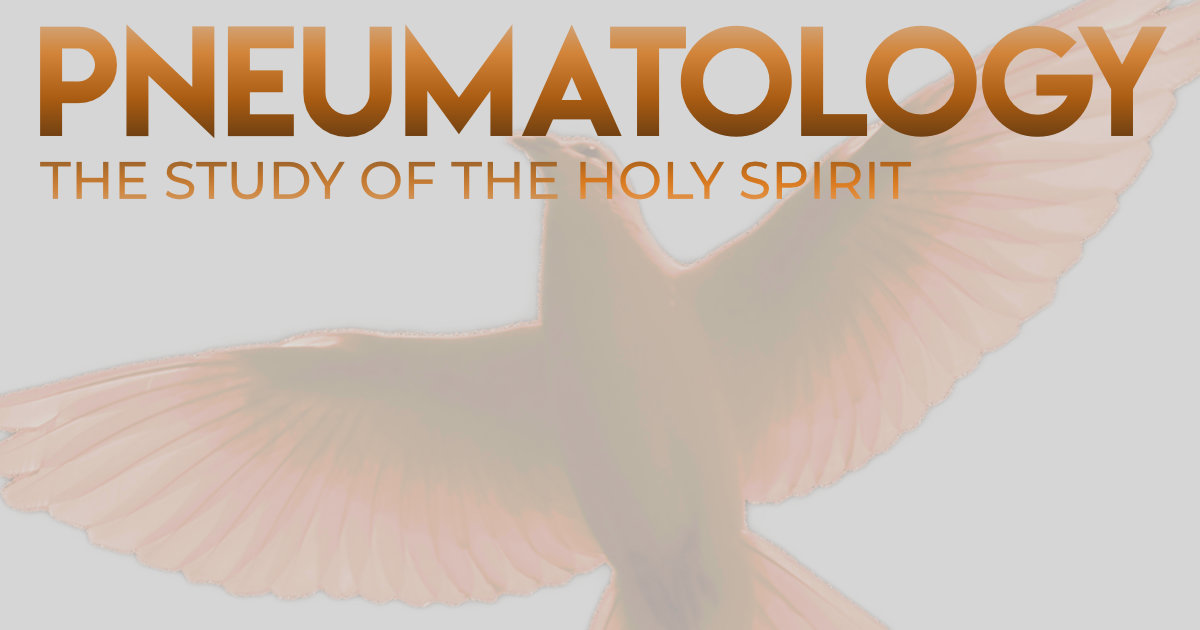Download a free lecture on this subject here.
 The study of the Holy Spirit is called pneumatology. The Greek word pneuma means “wind.” This is where we get the name for the pneumatic tube (e.g. when you go to the bank) and pneumonia (e.g. an inflammatory condition of the lung).
The study of the Holy Spirit is called pneumatology. The Greek word pneuma means “wind.” This is where we get the name for the pneumatic tube (e.g. when you go to the bank) and pneumonia (e.g. an inflammatory condition of the lung).
Over emphasis of the Holy Spirit
We feel that Pentecostals are guilty of overemphasizing the Holy Spirit. They overemphasize the wrong person and the wrong place. Pentecostals are often guilty of emphasizing the wrong person (the Holy Spirit), when they should emphasize Christ and his work. Likewise, they are guilty of emphasizing the wrong place (Pentecost), when they should emphasize the Cross.[1] We do not find a single prayer in the entirety of the NT that is directed to the Holy Spirit. One of the Holy Spirit’s central ministries is to get us to focus on Christ and his work. Thus we feel it is misdirected to pull the focus from Christ to the Holy Spirit.
Under emphasis of the Holy Spirit
We feel that some churches ignore the power and movement of the Holy Spirit. The early church fathers normally focused on the person of Christ (e.g. Christology), and most of the debates circled around his person and work. Meanwhile, the Holy Spirit was ignored. Even to this day, Louis Berkhof’s 833-page Systematic Theology devotes only ten pages to the Holy Spirit (“The Operations of the Holy Spirit in General” pp.467-476). Theologian Alister McGrath writes, “The Holy Spirit has long been the Cinderella of the Trinity. The other two sisters may have gone to the theological ball; the Holy Spirit got left behind every time.”[2]
Without a robust view of the Holy Spirit, the Christian life becomes a weekly funeral service, where we try to remember and imitate our dead Founder through “will power.” Needless to say, our understanding of the Holy Spirit is central to the Christian life.
Articles on the Holy Spirit
Who is the Holy Spirit? The study of the Holy Spirit is called pneumatology. The Greek word pneuma means “wind.” This is where we get the name for the pneumatic tube (e.g. when you go to the bank) and pneumonia (e.g. an inflammatory condition of the lung). Who is the Holy Spirit and what does he do in the Christian life? We will consider these questions here.
Spiritual Gifts This paper gives the definition, description, and dangers of each of the spiritual gifts mentioned in the NT. Since no biblical list is exhaustive, there could be more spiritual gifts. However, this study sticks to those gifts explicitly mentioned in Scripture.
The Charismatic Gifts The term “charismatic gifts” is really a misnomer. All gifts are described as charismata by Paul (In Greek, charis means “gift”). However, for clarification, we speak of the charismatic gifts as tongues, healing, and prophecy. We consider three views on the charismatic gifts that we find untenable, followed by a fourth view which is the position we hold.
Is the Baptism of the Holy Spirit Biblical? Pentecostals in the Assemblies of God movement affirm that all Christians have the Holy Spirit at conversion. However, in addition to receiving the Holy Spirit at conversion, Pentecostals believe in a “baptism of the Holy Spirit”—whereby the believer is baptized into the Holy Spirit and given special power for ministry. (This is sometimes called “baptism of the Holy Spirit” or the “second blessing”) To avoid arguing against straw men in this friendly discussion with our Pentecostal brethren, we will interact with the Assemblies of God position paper titled “Baptism in the Holy Spirit.”
Faith Healers Televangelist faith healers have spread across late night television stations like gangrene, claiming to heal the sick and hurting. While the theatrics of these faith healers seem strange, many Christians wonder if there is any merit to this movement: Jesus and the apostles healed the sick after all. Should Christians expect to heal the sick and dying today, or should we refrain from this sort of activity? We explore the claims of various faith healers today.
[1] I am indebted to Pastor Mark Driscoll for the communication of this point regarding Pentecostalism today. Of course, like Pastor Driscoll, we are friendly toward Pentecostals, but we feel that this critique is a clever way of describing an error in emphasis.
[2] McGrath, Alister. Christian Theology: An Introduction. Oxford: Blackwell, 1994. 240.
